
Minnesota is a state in the Upper Midwestern region of the United States. It is bordered by the Canadian provinces of Manitoba and Ontario to the north and east and by the U.S. states of Wisconsin to the east, Iowa to the south, and North Dakota and South Dakota to the west. It is the 12th-largest U.S. state in area and the 22nd-most populous, with about 5.7 million residents. Minnesota is known as the "Land of 10,000 Lakes" and has 14,420 bodies of fresh water covering at least ten acres each. Roughly a third of the state is forested. Much of the remainder is prairie and farmland. More than 60% of Minnesotans, about 3.8 million, live in the Minneapolis–Saint Paul metropolitan area, known as the "Twin Cities", the state's main political, economic, and cultural hub and the 16th-largest metropolitan area in the U.S. Other minor metropolitan and micropolitan statistical areas include Duluth, Mankato, Moorhead, Rochester, and St. Cloud.
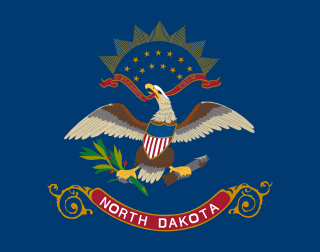
North Dakota is a landlocked U.S. state in the Upper Midwest, named after the indigenous Dakota Sioux. It is bordered by the Canadian provinces of Saskatchewan and Manitoba to the north and by the U.S. states of Minnesota to the east, South Dakota to the south, and Montana to the west. North Dakota is part of the Great Plains region, characterized by broad prairies, steppe, temperate savanna, badlands, and farmland. North Dakota is the 19th-largest state, but with a population of less than 780,000, it is the fourth-least populous and fourth-most sparsely populated. The state capital is Bismarck while the most populous city is Fargo, which accounts for nearly a fifth of the state's population; both cities are among the fastest-growing in the U.S., although half of all residents live in rural areas.

South Dakota is a landlocked state in the North Central region of the United States. It is also part of the Great Plains. South Dakota is named after the Dakota Sioux tribe, which comprises a large portion of the population with nine reservations currently in the state and has historically dominated the territory. South Dakota is the 17th-largest by area, but the fifth-least populous, and the fifth-least densely populated of the 50 United States. Pierre is the state capital, and Sioux Falls, with a population of about 213,900, is South Dakota's most populous city. The state is bisected by the Missouri River, dividing South Dakota into two geographically and socially distinct halves, known to residents as "East River" and "West River". South Dakota is bordered by North Dakota to the north, Minnesota to the east, Iowa to the southeast, Nebraska to the south, Wyoming to the west, and Montana to the northwest.

Sargent County is a county in the U.S. state of North Dakota. Its county seat is Forman, and its most populous city is Gwinner. The county is named in honor of Homer E. Sargent, a 19th-century general manager of the Northern Pacific Railroad Company. The county spans an agricultural region between the James River and Red River valleys in southeastern North Dakota dotted with various sloughs, lakes, and hills.

Fargo is the most populous city in the U.S. state of North Dakota and the county seat of Cass County. The population was 125,990 at the 2020 census, which was estimated to have grown to 133,188 in 2023, making it the 218th-most populous city in the United States. Fargo, along with its twin city of Moorhead, Minnesota, form the core of the Fargo–Moorhead metropolitan statistical area, which had a population of 248,591 in 2020.
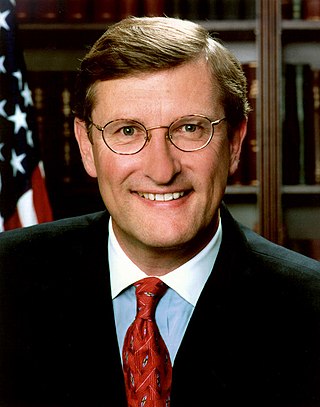
Gaylord Kent Conrad is a former American politician who was a United States Senator from North Dakota. He is a member of the Democratic Party. First elected to the Senate in 1986, he served as chairman or Ranking Member of the Senate Budget Committee for 12 years.

Byron Leslie Dorgan is an American author, businessman and former politician who served as a United States Representative (1981–1992) and United States Senator (1992–2011) from North Dakota. He is a member of the Democratic Party.
Bronte International University is an unaccredited post-secondary educational institution formerly in South Dakota. It is widely considered to be a diploma mill, operated from an unknown location. Its website offers "fast" degrees for "life experience."

Mary Kathryn "Heidi" Heitkamp is an American lawyer and politician who served as a United States senator from North Dakota from 2013 to 2019. A member of the North Dakota Democratic–Nonpartisan League Party, she was the first woman elected to the U.S. Senate from North Dakota. Heitkamp served as the 20th North Dakota tax commissioner from 1986 to 1992 and as the 28th North Dakota attorney general from 1992 to 2000. As of 2024, she is the last Democrat to hold or win statewide and/or congressional office in North Dakota.
Cory Fong is a North Dakota public servant. He is a Republican, and the former state State Tax Commissioner.

The 2012 United States Senate election in North Dakota took place on November 6, 2012, concurrently with the 2012 U.S. presidential election, other United States Senate elections, United States House of Representatives elections, and various state and local elections. Incumbent Democratic-NPL Senator Kent Conrad decided to retire instead of running for reelection to a fifth term.
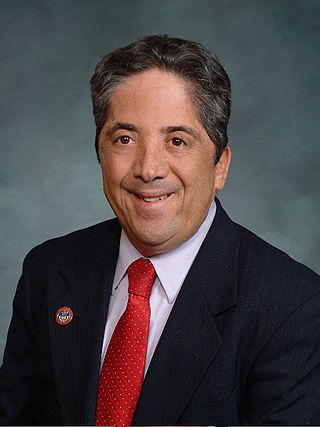
John Michael Kefalas is a politician in the U.S. state of Colorado. An educator and lobbyist before first running for the legislature in 2004, Kefalas defeated a Republican incumbent to win election to the Colorado House of Representatives as a Democrat in 2006. Kefalas won election to the State Senate in 2012 and represented Senate District 14 until early 2019. In 2018, Kefalas ran for and won a seat on the Larimer County Board of County Commissioners. He resigned his Senate seat, and a vacancy committee nominated Joann Ginal to replace him.

The structure of the government of South Dakota is based on that of the federal government, with three branches of government: executive, legislative, and judicial. The structure of the state government is laid out in the Constitution of South Dakota, the highest law in the state. The constitution may be amended either by a majority vote of both houses of the legislature, or by voter initiative.

John N. Hagan was a North Dakota Republican/NPL politician who served as the North Dakota Commissioner of Agriculture and Labor from 1917 to 1921 and from 1937 to 1938. He is one of three politicians in the state ever to be recalled; he was recalled during his first time in the office along with fellow NPL politicians Governor of North Dakota Lynn J. Frazier and North Dakota Attorney General William Lemke in 1921.

Carl R. Kositzky was a North Dakota public servant and politician with the Republican Party who served as the North Dakota State Auditor from 1917 to 1920.
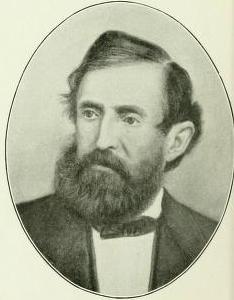
William Milnor Roberts was an American civil engineer. Roberts was one of the most prolific and prominent civil engineers of his generation in the United States. As a young civil engineer, he was involved in the construction of the Eads Bridge, held the title of the chief engineer of Northern Pacific Railroad, and was president of the American Society of Civil Engineers scarcely two decades after its founding,

A general election was held in the U.S. state of North Dakota on November 4, 2014. Five of North Dakota's executive officers were up for election as well as the state's at-large seat in the United States House of Representatives. Primary elections were held on June 10, 2014.

Craig Francis Smith is an American college basketball coach who is the head coach for the Utah Utes men's team of the Big 12 Conference. He served as an assistant for Tim Miles at four schools – Mayville State, North Dakota State, Colorado State, and Nebraska. Smith was also the head coach at Mayville State from 2004 to 2007, at South Dakota from 2014 to 2018, and at Utah State from 2018 to 2021.

John Ogden was an American military officer, minister, veteran educator, and abolitionist. He served in the Union Army during the American Civil War, being captured in 1864 and held prisoner until the conflict ended. He became an education official with the Freedmen's Bureau in Tennessee and co-founded a school for African Americans, Fisk School, that preceded Fisk University. He also served as the third North Dakota Superintendent of Public Instruction in the early 1890s.
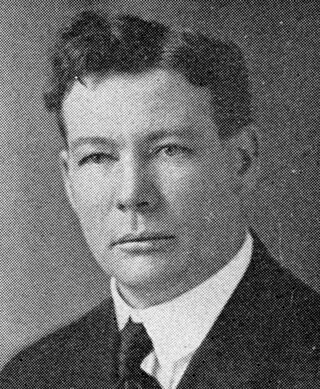
George E. Wallace was an American lawyer and politician from North Dakota. He served as the first North Dakota Tax Commissioner from 1919 to 1921.

















